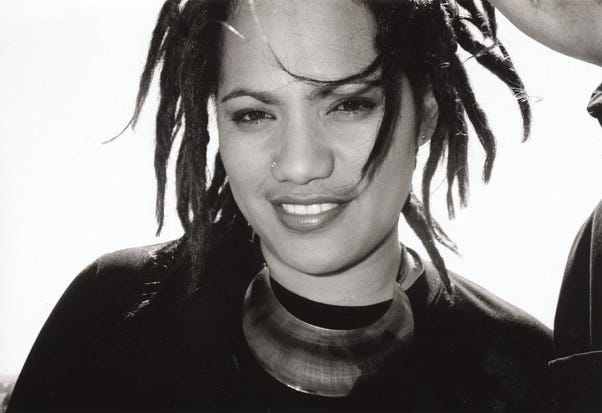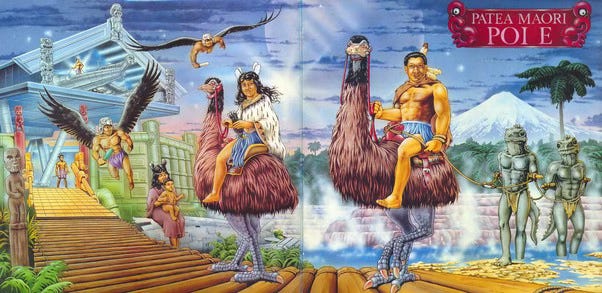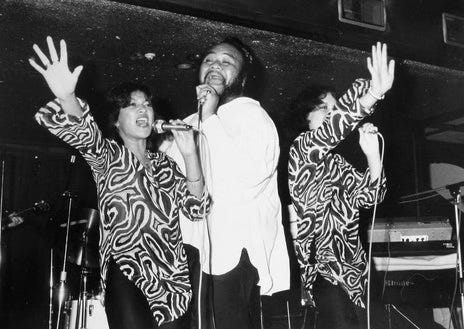Betty-Anne Monga - quite possibly the most soulful singer Aotearoa has ever produced.
The sun’s shining but there’s now a chill in the air here - autumn is marching forward and I’m about to head back to Europe. Spring will be hinting at arriving but, knowing Britain, it will surely be a good while before I experience an endless summer again.
For my final Yak post from Aotearoa I’ve decided to select 7 local artists who share a soulful flavour. Just as everywhere else, there’s always been plenty of enthusiastic music making across these islands, most of it making little impression beyond the enthusiastic local audiences who get behind the artists. A handful of Kiwi musicians have made it big internationally - Neil Finn and Lorde being the obvious examples - while The Chills/Clean/Flying Nun early 80s axis continues to command a cult following amongst those in love with droll, melodic, lo-fi guitar rock.
The striking cover for Patea Maori Club’s Poi E album. Maori-futurism?
Outside of Australia (where local musicians shift in search of larger audiences in the same way Irish bands move to England), the rest of the world took little interest in Kiwi music - admittedly, in the pre-Internet age local recordings rarely were released overseas and, when the artists relocated to London or LA, they were roundly ignored. Where the Aussies could list everyone from The Easybeats to INXS as world beaters, for a long time we could only mention Split End having a Top 20 hit in the UK with I Got You.
Obscurity and isolation inevitably ensure that obsessive record collectors start sniffing around and there’s now enthusiasm in foreign climes for Kiwi garage rock of the 60s (there was lots of it - and much is pretty rough if very lively: check the 3 Cd box on Cherry Red, How Was The Air Up There - compiled by Grant Gillanders, who runs Frenzy, a reissue label dedicated to ensuring everything from post-WW2 Polynesian ballroom bands to lost psyche recordings).
Dalvanius and the Fascinations at work in a Sydney club in the 1970s.
Kiwi reggae also travels well - Fat Freddy’s Drop and Katchafire have led the way in opening up the US and European circuit (reggae remains very popular here - generally Bob Marley/UB40 influenced). While Kiwi psyche and punk’s brief, shrill sojourns didn’t consist of many actual records, yet both genres are now extremely collectable: Human Instinct, a psychedelic power trio led by Billy TK (“the Maori Hendrix”) are venerated by German heads, while punk collectors in the US hunger for original Suburban Reptiles and DumDum Boys vinyl.
Sadly, Kiwi soul doesn’t attract much attention abroad. I guess this is because there are so many fine US soul/funk musicians - alongside lots of noted UK acts also plugging away - that no one is interested in the occasional effort from down under. And it’s not like there was a local Motown/Stax label to drive the identity of those singing here.
Still, Kiwis have, on occasion, made impressive efforts at playing R&B/soul/funk/ disco/rap, most notably when Maori/Polynesian artists step up to the mic’. Thus “Polynesian Soul”. Here’s a selection of summer flavoured songs to brighten your day.
ARDIJAH - MOONLIGHTING & E IPO
&
Ardijah are a soul-funk band who came out of Otara, a Polynesian migrant suburb in South Auckland in the 1980s, led by multi-instrumentalist Ryan Monga and his vocalist wife Betty-Anne Mongo. I used to go and see them regularly in the late-80s, and they were easily the best live Kiwi band of their era: Ardijah knew how to boss a groove like few local bands could and always delivered a really dynamic performance. Most impressive was Betty-Anne, who might just be the finest soul singer Aotearoa has ever produced. Back then legend had it that Arif Martin wanted to sign her but Ryan insisted he sign Ardijah (so no deal).
Aridjah’s records were never outstanding - Ryan’s an average songwriter and he often played all the instruments (let’s just say he was no Prince) - yet Betty-Anne’s an outstanding singer and I always enjoy listening to her. Moonlighting is an imaginative interpretation of - I believe - a Leo Sayer tune (not one I know). Its got a loose, soul-reggae feel and is matched with a great video filmed in Otara - I like it more than their earlier efforts - while E Ipo is a Maori anthem, once a huge No 1 hit here for the late Prince Tut Teka (an iconic Maori ballad singer). The video, filmed on a Maori marae, is a treat.
OMC - RIGHT ON
So to OMC - readers who were listening to Top 40 radio in the mid-90s might recall OMC as the Kiwi band who enjoyed a huge international hit with How Bizarre, then subsequently vanished, never to be heard from again. Its a sad story - OMC stands for Otara Millionaires Club, Otara being the aforementioned Polynesian migrant suburb in south Auckland, and were initially a rap outfit led by Pauly Fuemana, a charismatic youth of Maori-Niuean heritage. Pauly paired with Alan Jansson, a gifted producer/engineer, and together they created a hybrid sound that blended Latin and Hawaiian flavours with contemporary beats, Fuemana’s distinctively nasal Kiwi accent speak-singing the songs.
While I love How Bizarre, it’s Right On that is quite possibly my favourite Kiwi tune ever. It captures the sound of the Auckland summers of my youth and is just a magnificent celebration of being young and having fun. And its exemplary Poly soul - the chunky strummed guitar, the Hawaiian steel, the harmonies… bliss!
“Polynesian soul” - I sometimes wonder if I coined that term back in the mid-90s when Charlie Gillett, the British writer and radio presenter, started regularly spinning OMC’s Right On on his BBC London radio show and I told him “that’s what we call ‘Polynesian soul’”. Charlie introduced Right On as “Polynesian soul” the next time he played it and the term lingers (at least amongst Kiwi aficionados). If someone with ears as good as Charlie Gillett picked Right On out then you know there’s magic in the grooves.
As to OMC - Pauly toured the globe promoting How Bizarre then returned to Auckland, literally an Otara millionaire. He began to party and spend, blasting through his fortune while never making more music. He died aged 40 in 2010.






